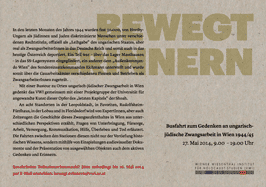Interventions
Since the 1980s, the politics of remembrance and the central place held by the Holocaust therein have moved into the focus of a global cultural policy debate. Triggered by popular formats such as TV series, the establishment of Holocaust museums, and the erection of memorial sites and memorials, and by documentations, feature films, plays, as well as exhibitions, the highly controversial debate has addressed and continues to address the question of the sense and form of Holocaust remembrance as well as its possibilities and limits.
The Vienna Wiesenthal Institute for Holocaust Studies (VWI) understands its educational mission as the task of preserving the visibility of the cultural context of remembrance and the media anthropological background as well as the discursive context of popular remembrance of the Holocaust and other genocides for its audience. The materiality and the act of remembrance itself are focussed on by making these the very topic and issue of educational questions. This is achieved on the one hand via academic debate and reasoning, on the other by testing the issue in various contexts by experiment. The latter takes place in the framework of “Interventions in Public Spaces”, involving especially artists and writers.
rÆsonanz_en
Echoes, memories, and aftereffects – resonances – are usually laden with emotion, sentimental and individual. The aim of this event series is therefore to cultivate anew a conversation beyond the today much discussed ‘echo chambers’ of social media and to offer a space for mutual thought and reflection – in other words for resonating – at the intersection of living memory, collective memory, and scholarly analysis: Different aspects of, approaches to, and perspectives on the research areas of the VWI will be sounded out here; intergenerational conversations will be enabled; questioning, ruminating, and doubting will be allowed – borrowing freely from the words of Bertolt Brecht and Marcel Reich-Ranicki: “Curtains closed and all the questions open.”












